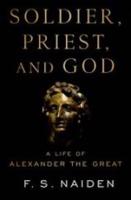
OUP (2019) h/b/ 407pp £18.99 (ISBN 9780190875343)
Author of an academic book with the same publisher on ancient supplication, N. announces in his preface this book’s intended readership (the layman) and its emphasis on Alexander as a religious leader, one largely neglected in modern treatments of an otherwise well-worn subject. Through this lens N. gives a fresh narrative history of Alexander. References and notice of modern debates are relegated to end-notes. Three appendices collect ancient sources for, respectively, ‘acts of sacrifice and related rituals,’ ‘acts of supplication,’ and ‘formal meetings of Alexander’s Companions’. Each chapter is enlivened with a finale finding some point of alleged relevance in the ‘reception’ literature of later times, notably the mediaeval Alexander-Romance.
Chapter 1 gives selected aspects of the Macedonian background, emphasising the priestly role of the Macedonian king and rapidly overviewing Macedonian religion, along with the more familiar fare of Philip’s reorganisation of the army, the battle of Chaeronea, and Alexander’s accession. Characteristically of the book as a whole, in the interest of readability N. smooths a path through the modern uncertainties. More use of the mounting evidence from Macedonian burials, with archaeologists now identifying high-status priestesses and warrior-priests of the 6th-4th centuries BC on the basis of grave goods, might have nuanced the view that in Macedon ‘the king was the only famous priest’. The material evidence also highlights the deficiencies of the ancient writings about Macedonian society (to which the reader could usefully be more alerted) as to the larger problem of the sources for Alexander himself, which the narrative scarcely discusses, although they are a topic of historical fascination in their own right.
In chs. 2-3 N. follows Alexander as far as Cilicia and imparts the military story well, both the battling and the strategy underlying Alexander’s swerving route through Asia Minor (to keep the enemy guessing). Chapters 4-6 take the narrative down to 329 BC, with chapter-headings theming a succession of kingships (Tyre, Egypt, and Babylon) which Alexander now encountered, and his self-positioning in turn as the new occupant, as N. presents him, of these roles. This focus generates discussions of the non-Greek religious systems of those parts (including Jerusalem and Samaria too, although Alexander in person visited neither), and reconstructions of local religious rites in which Alexander is said to have participated. More of the author’s manner is revealed. The reader is frequently told what people, including Alexander of course, thought (there is even a reference to ‘the Macedonian mind’). Speculation includes a lengthy description of how Alexander’s (purely hypothetical) visit to Egyptian Thebes might have gone.
In ch. 7 (‘A vacant throne’) the narrative follows Alexander into Iran, presents the burning of Persepolis as a collective decision of Alexander’s council (the colourful alternative version of antiquity is relegated to an end-note) and plays down Alexander’s increasing adoption of Persian customs following the murder of Darius, as does ch. 8, except that here Alexander’s royal pages view the famous obeisance affair of 327 BC as a sign that Alexander sought recognition as a Persian god, which cannot be right. Ch. 9, taking the reader to the Indian mutiny, starts, as ch. 1 did, with regional geology and tectonics, although more as local colour, not with the determinism of, say, Lewis Dartnell’s recent book (Origins: How the Earth Made us). Two more chapters cover Alexander’s forced return to Mesopotamia and his death at Babylon in 323 BC. A final chapter focuses on the long-term fate of the corpse.
The narrative highlights how Alexander, moving through ancient worlds full of their own gods, used religion for political and military expediency. Some of the religious overtones imparted to the political and military narrative left this reviewer uneasy; likewise the handling of some quite major debates. Oddly, given the author’s theme, the narrative seems to assume that Alexander himself sought deification, but does not analyse the well-known problems on this point. In sum, there is much of value here which scholars will want to consult. As for the general reader, I am not so sure.
Tony Spawforth
Brighton, U.K.
See below for online informational guide about Alexander the Great:
https://alexander-thegreat.net/
